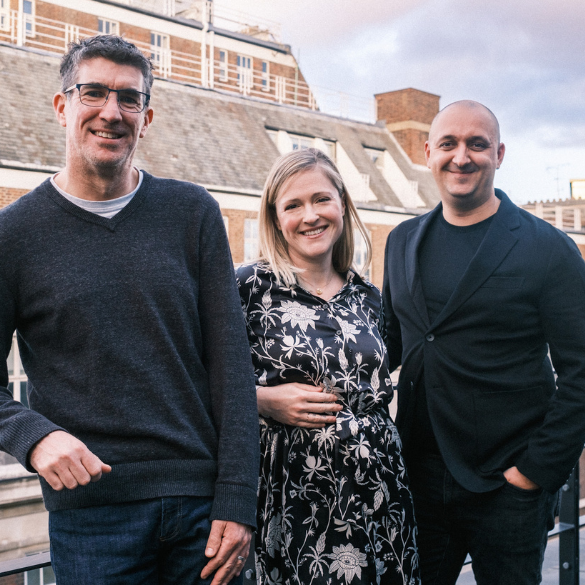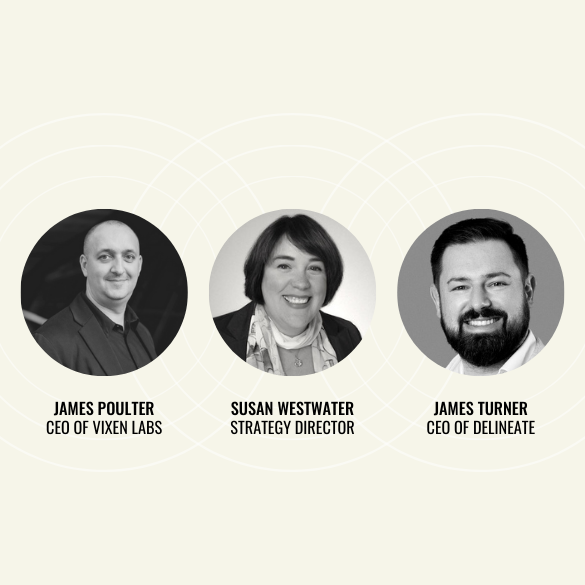Hey Stephen! You’ve recently joined Vixen as a Non-Exec Director. Can you tell us a little bit about your background?
Yeah, so early on in my career I built a tech PR agency, and sold it; then a digital PR agency, sold it. I then worked within an agency inside Omnicom helping them build out from a publicity based model to embrace all forms of digital and social. So my career’s followed the trajectory of media change. Vixen’s another story of shift: the rise of audio.

That’s cool. You’ve been at the forefront of change, whatever that means in the media world.
Exactly. And Vixen feels like a good part of that story. There are two ways of seeing the rise of audio, I guess. Firstly in its use in media – things like podcasts and social networks such as Clubhouse – and secondly in automation and machine intelligence such as Amazon Alexa, Apple Siri, and Google Home.
Given your background in agencies, what do you think makes an agency successful, ultimately?
It’s very simple. We could talk about people and talent and all the rest of it, but first and foremost is the proposition. For a piece of work I’m doing, I went to the Office for National Statistics, and they said there are more than 4500 PR agencies in the UK. If you look at advertising, marketing, and PR, it’s like 40,000 agencies. So you’ve got to have a very, very clear proposition and identity to cut through that noise.
Of course, Vixen does this, because it’s got such an obvious lead in voice, and voice strategy, as well as the delivery of products and services behind that. It’s exceptional for an agency to have such a clear point of difference; people would struggle to name Vixen’s competitors. That’s thanks to the first-mover advantage in the industry – you know, Jen and JP have been very early to this, but they’ve also been incredibly assertive about the agency proposition.
“YOU’VE GOT TO HAVE A VERY, VERY CLEAR PROPOSITION AND IDENTITY TO CUT THROUGH THE NOISE.”
Toshiba, IKEA, Amazon, and BMW are among your past clients. What have you found to be the main challenges – and opportunities – of working with multinational companies?
One of Vixen’s strengths is the brilliant team that has been built behind that strong proposition. And it’s not just JP in strategy, Jen in creative and production: they’ve got multiple people with incredible talent on board, so naturally, Vixen has international appeal.
Usually an agency has to work really hard in its local market to establish a good reputation and then might start to have conversations about working internationally. But actually at the moment, because of the business’s reputation, because we’re right at the vanguard of voice strategy, people are coming to us.
The challenge is: how do you manage that? How do you scale a business to work internationally? How do you manage relationships between countries, between continents? You’ve got to look at it from the cultural point of view. There are differences between a corporate European point of view and a North American point of view, for example, where one believes that everything that has to be done tomorrow should be done today!
So culture’s the big one, first and foremost. Of course there are always challenges with working internationally, around the sun, which Vixen already does well with team members in India and different European timezones.
And then you get down to processes, workflows, systems, all of that management side of things. At the moment we’re building a centre of excellence in the UK, and managing to serve clients around the world, but that might change. That’s starting to change already.
“THERE NEEDS TO BE SPACE FOR DISCUSSION GIVEN THE CONTINUUM OF OPINION.”
Yeh… as someone who spent winter lockdown in a small terraced houseshare, I can’t identify!
Right? If you’re like my daughter, sharing the kitchen to work, it’s challenging. There’s also the social aspect which companies have to be able to recognise. Once we leave full time education, the formative way to establish relationships is through work, and those aren’t as easily formed over Zoom. Those of us who have had longer careers have those relationships established. So any post-pandemic discussions have to be dealt with carefully, because inevitably we all bring our own biased mindsets.
Another key part of better business is going beyond stating a goal or signing up for a pledge; you’ve got to measure your progress, set benchmarks. The big one at the moment is business targets for Net Zero, setting dates like 2030 and 2050. Anyone can say anything’s gonna be the case in 25 years! You’ve got to have an actionable plan, and measure against it.
Agreed. I’m seeing a lot of companies aiming for net-zero purely by offsetting, which kinda misses the point – they have to measure their carbon emissions, then start reducing them.
But back to Vixen! My final question is about voice as an interface. What excites you most about it?
It’s just natural. First of all, the thing about voice as a medium is it’s the most intimate form for developing a relationship with somebody. That’s definitely been a learning for me. But there are podcasts I listen to, for example, and I’ve developed a relationship with the individual, even though I don’t know them! I run a podcast with my wife about comms and people who have listened to us feel an instant connection.
So I’d say that potential for emotional connection excites me, but then also it’s just so bloody useful. I can sit in bed and ask what the weather is down on the beach. It’s utilitarian. And it’s only gonna get more so as the industry develops.
Absolutely. That’s what we’re hoping for, anyway – and building towards! Thank you so much for your time Stephen; I really appreciate your thoughtful conversation.





